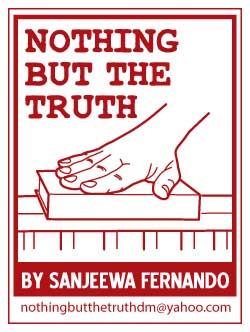Reply To:
Name - Reply Comment

I wish all our readers a Merry Christmas: to those who believe that Jesus Christ is their saviour, the joy of the news of salvation from death and darkness and deliverance into eternal life and to others, well, the peace, Joy and reconciliation that the Christmas message brings.
To many Christians and Catholics, the Christmas of 2019 is not going to be the happy, jolly and merry celebration that it used to be. Those who lost their loved ones, family, friend, neighbour or fellow worshipper in the brutal bomb attack that took place on Easter Sunday this year, would hardly see any reason or a longing to celebrate Christmas joyously. It ripped families apart, neighbourhoods, especially, in the Catholic heartland of Negombo became places where moaning, weeping and sobbing was heard day and night! A country which had suffered more than enough for three decades had hardly tasted the sweetness of prolonged peace when tragedy struck. We had a decade of peace but not more.
The calls for revenge, avenging and payback emanated from many quarters. But the followers of Jesus Christ restrained themselves and their brethren from taking vengeance upon themselves and allowed the law, albeit belatedly, take its course. They obeyed the biblical principle stated in scripture where the Lord says ‘Vengeance is mine’ and put it in to practice at the darkest hour that Sri Lankan Christianity had faced in centuries. I am proud as a Catholic Christian to say, that we showed to the world that Religion was not mere ritual and lip service but something that you had to inculcate in yourself that you could put it in to practice. They showed that their religion was something that forgave the enemy, turned the other cheek when slapped and went two miles when asked to go one. They did what their leader Jesus Christ did on the cross; forgiving His persecutors, bleeding, suffering, dying.
This world is turning in a dangerous direction politically, economically and socially. On the political arena, ideologies such as capitalism, communism, globalism etc. are on the decline and nationalist sentiments are taking the front state. Not that capitalism and communism did not have their evils in their own right.
But at least they kept the dangerous and suicidal racist, ultra-nationalist and chauvinist tendencies that flickered underneath human civilization in check. Yet their decline has ushered in leaders who have issued from the monolithic ethnic blocks with hardly any tolerance to or acceptance from other ethnoreligious groups, the minorities in particular. It is happening in Europe as we speak, it has happened in the US and it is happening in Turkey, India and elsewhere.
It is and has been happening here.
For a country that has been rocked by violence throughout its post-independent history, with its fair share of revolt, pogroms, civil wars and such incidents and sentiments issuing from them has now become normal. Intolerance, suspicion, fear bordering on phobia has permeated every stratum of society. Unlike the era of the 1983 black July, the subscribers to these tendencies are not confined to the lowest strata of society. They come from all backgrounds, even some calling them intellectuals.
The message that Christmas brings is one of peace, joy, communion and reconciliation. It requires understanding what the other human being is going through. The message of Christ does not ask us to judge but to listen. When the so-called pious Jews of Jesus’ day caught a woman, red-handed, committing adultery they wanted to stone her. But Jesus asked those who had not committed any sin to throw the first stone. No one could touch a stone. A self-righteous attitude not only personally but as a collective could do a lot of damage to a social fabric that has historically inherent strains based on ethnicity.
We showed to the world that Religion was not mere ritual and lip service but something that you had to inculcate in yourself that you could put it in to practice.
 When Jesus was walking the dusty streets of Israel, the same ethnoreligious tensions existed between the Samaritans and the Jews with the latter considering the former as inferior: an ethnoreligious supremacist idea, in modern parlance. In a parable which has now become a household reference and named the ‘Parable of the Good Samaritan,’ Jesus told the story of a Samaritan, who upon seeing a Jew waylaid by robbers left to die, went out of the way to take care of the victim, even though he knew that he was looked down upon by the Jews in general. Compare this with a scenario, where people, who have known their Muslim neighbours for decades reported them to the authorities for no reason whatsoever. How their women were harassed in public.
When Jesus was walking the dusty streets of Israel, the same ethnoreligious tensions existed between the Samaritans and the Jews with the latter considering the former as inferior: an ethnoreligious supremacist idea, in modern parlance. In a parable which has now become a household reference and named the ‘Parable of the Good Samaritan,’ Jesus told the story of a Samaritan, who upon seeing a Jew waylaid by robbers left to die, went out of the way to take care of the victim, even though he knew that he was looked down upon by the Jews in general. Compare this with a scenario, where people, who have known their Muslim neighbours for decades reported them to the authorities for no reason whatsoever. How their women were harassed in public.
Easter Sunday was the day that Jesus Christ rose from the dead, defeating the evil of this world and thus ensuring eternal life for all. But in our context this year, it became a dividing line, that perhaps, would remain so for the rest of our lives. Now, after these attacks, Easter Sunday is not about Jesus or salvation any more; it is about a bomb that went off in the church. It is about suspicion, fear, intolerance and phobia. In such a context the need arises to use religious festivals such as Christmas as rallying points against ethnoreligious supremacist ideas that result in intolerance towards everything that is not identical with what is ours: our beliefs, lifestyles, culture and ways of life.
As we celebrate Christmas this year, after the Black Easter, if one may use that term, we need to be mindful of the burning need to reconcile communities with ethnoreligious sensitivities who have been dealt with harshly within recent times. Development of material prosperity could not only appease the conflicting ideas and sentiments that various religious communities harbour, sometimes leading up to open confrontations but always simmering in the background, waiting for the slightest spark to ignite. The recently concluded Presidential election reflected the fact that some ethnoreligious communities are so far and detached from their fellow citizens belonging to different backgrounds in terms of race and religion.
When Jesus Christ was born to a poor family, in an occupied nation, fleeing to exile as a refugee, He identified himself with the oppressed and the dispossessed; be it civil war, religious fundamentalism or supremacist ideologies Christianity stands up as a force for justice, innocence and reconciliation. Christmas in such a context is a reminder that social justice, as much as it is one of the basic tenets of Christian ideology, leave aside its theological core, is a must for lasing and holding peace. A humble, as opposed to a haughty and discriminatory viewpoint on one’s faith, is a prerequisite for development and prosperity as well.
Let the Black Easter be an eye-opener, not only for followers of Christ but to all communities that the way forward is together. Divided, we are doomed.! In that sense let Christmas be the catalyst for a more tolerant and inclusive life ideology as we enter a new and unique epoch in our history.
Merry Christmas to all!